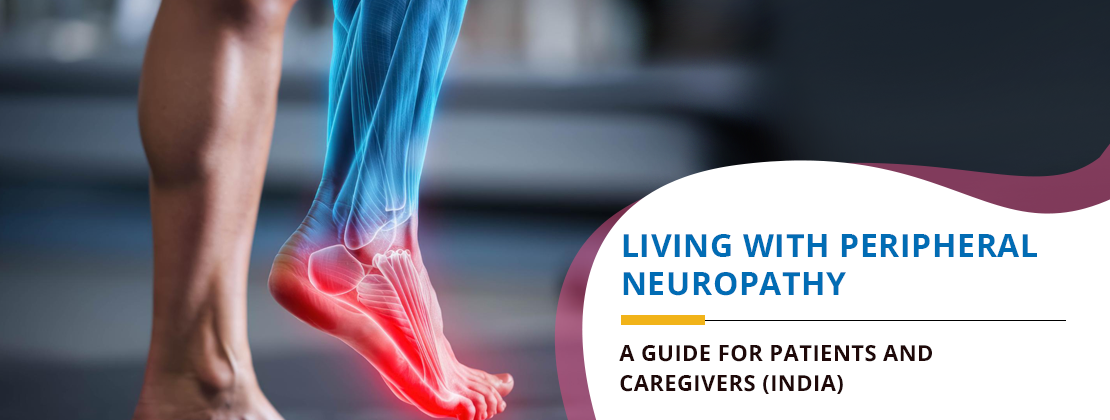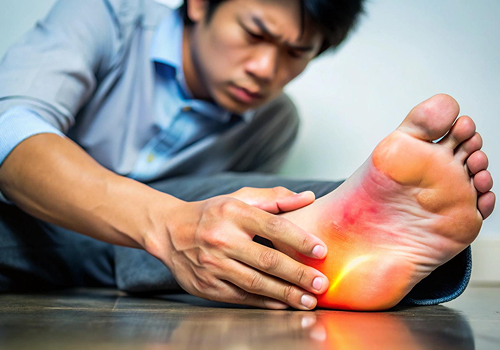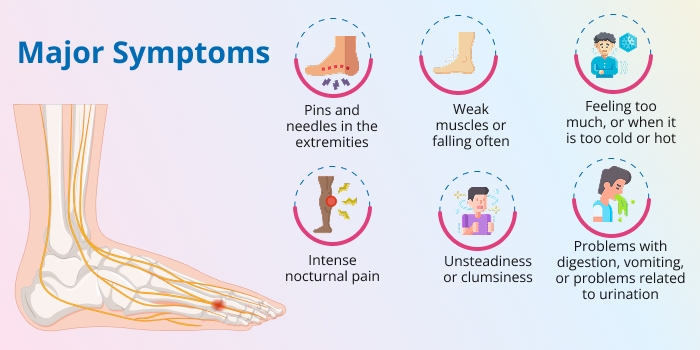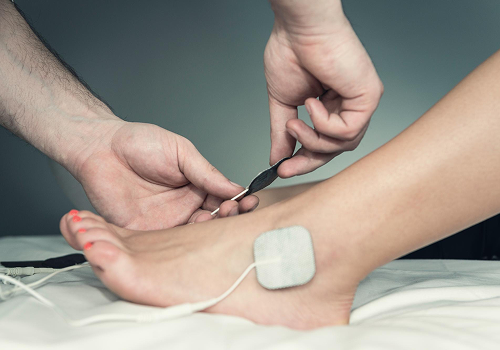
Home / Blog / Living with Peripheral Neuropathy: A Guide for Patients and Caregivers (India)
July 25, 2025
In India, peripheral neuropathy is becoming increasingly common among individuals with diabetes, a history of cancer, and those of old age.
It is a worsening illness that impairs sensation, mobility, and the autonomic system through damage to nerves outside the brain or spinal cord. If not treated, it can greatly affect how one lives and cause serious problems such as inability to move, long-term pain, or even total paralysis.
This guide offers insights into peripheral neuropathy symptoms, its impact on day-to-day activities, available neuropathy pain relief options, and practical support for carers.

Peripheral neuropathy refers to a condition wherein the peripheral nervous system (the network of nerves connecting the brain and spinal cord to other parts of the body) is damaged. This causes problems such as pain, a loss of sensation, weakness, or tingling sensations. The disorder may involve one or all of the three types of nerves: sensory, motor, and autonomic.
Although it is a common problem worldwide, the number of Indians who are at risk of suffering from diabetes, malnutrition, and exposure to chemotherapy agents among cancer patients is on the rise.
|
Causes |
Prevalence of Peripheral Neuropathy (India) |
|
Diabetes Mellitus |
Affects 77 million Indians; ~50% develop neuropathy |
|
Vitamin B12 Deficiency |
Common due to vegetarian diets |
|
Chemotherapy |
Seen in 30–40% of cancer patients |
|
Alcoholism |
Accounts for ~10% of neuropathy cases |
|
Infectious Diseases |
Leprosy, HIV, and Hepatitis B are regional contributors |
In India, it is important to identify and treat diseases at an early stage because many people are growing old and suffering from diseases that are caused by lifestyle disorders.
Identifying peripheral neuropathy symptoms early can help avoid permanent nerve damage. As the signs appear slowly, they are frequently taken as tiredness or getting old.

Fact: In India, patients usually postpone diagnosis, and most of them reveal signs of illness after a period of about 6 to 12 months.
If you have diabetes or are being treated for cancer and you feel continuous neuropathy pain in your feet, you should consider consulting a neurologist at one of the best neuro hospitals in Ahmedabad, India, like HCG, at the earliest.
Peripheral neuropathy affects daily life as it disrupts normal activities and reduces self-reliance.
|
Area of Life |
Impact of Neuropathy |
|
Mobility |
Increased risk of falls due to numb feet |
|
Work Productivity |
Difficulty with typing, lifting, or standing |
|
Sleep |
Night-time neuropathy pain interferes with rest |
|
Mental Health |
Anxiety, irritability, and depression from chronic pain |
|
Social Life |
Isolation due to limited physical activity |
It is important for old people to have physical therapy and home modifications such as non-slip floors, handles, and good lighting to prevent falls and help them stay mobile.

Neuropathy pain relief is not the same for everybody. Peripheral neuropathy treatments are tailor-made for them to meet the individual health needs of each patient.
Commonly recommended peripheral neuropathy treatments include:
|
Medication Type |
Common Drugs (India) |
Purpose |
|
Pain relievers |
Paracetamol, Ibuprofen |
Mild pain |
|
Antidepressants |
Amitriptyline, Duloxetine |
Modify the brain’s pain signals |
|
Anticonvulsants |
Pregabalin, Gabapentin |
Reduce nerve overactivity |
|
Topical Treatments |
Lidocaine patch, Capsaicin cream |
Localized pain relief |
Patients with peripheral neuropathy can speak to their doctor, who may prescribe appropriate medications based on the patient’s needs.
Physical therapy involves doing regular exercises that increase steadiness and flexibility and minimise discomfort surges, especially among the elderly.
TENS is a pain-blocking treatment that involves the use of mild electric pulses to gently stimulate the nerves in the extremities through the skin. The stimulated nerve cells release endorphins, which act as painkillers and block pain signals. It is a non-invasive treatment.
Visit HCG, the best neuro hospital in India, for modern tests, multispecialty pain clinics, and both conventional and complementary therapies.
Patients who proactively adopt healthy habits often experience better outcomes in the long run in their attempts to manage peripheral neuropathy.
|
Habit |
Why It Helps |
|
Blood sugar control |
Prevents further nerve damage in diabetics |
|
Quit alcohol/smoking |
Slows progression of nerve damage |
|
Nutrient-rich diet |
B vitamins (B1, B6, and B12) and omega-3s support nerve health |
|
Daily exercise |
Improves circulation and reduces stiffness |
|
Regular foot care |
Prevents unnoticed injuries that can lead to ulcers |
Participation in support groups and counselling, which are usually found in top neuro hospitals in India, such as HCG Hospitals, is encouraged, as it can help prevent emotional distress, anxiety, and depression that may arise from chronic pain.
Additional Reading: Neurological Rehabilitation: Restoring Function and Quality of Life | HCG Hospitals
Carers play a crucial role in assisting patients to remain independent, particularly if neuropathy impairs their day-to-day activities.
In India, where family caregiving is deeply rooted, understanding the patient’s physical and emotional needs can help prevent complications and improve morale. Carers should also remember to care for their mental health and seek respite when needed.
Peripheral neuropathy goes beyond mere discomfort in the arms and legs, as it may lead to loss of freedom, self-assurance, and general health. Nevertheless, prompt identification of peripheral neuropathy symptoms, appropriate pain relief strategies, and personalised peripheral neuropathy treatment plans can restore a bearable state of existence.
If you or someone close to you has neuropathy pain in the feet, see a doctor immediately. HCG, the best neuro hospital in India, provides precise identification, multi-sided treatment, and aftercare services for a long period.
Take charge. Learn more. Make informed choices. With the right tools, knowledge, and support system, living with neuropathy doesn’t mean giving up on a quality life; it means adapting and thriving.